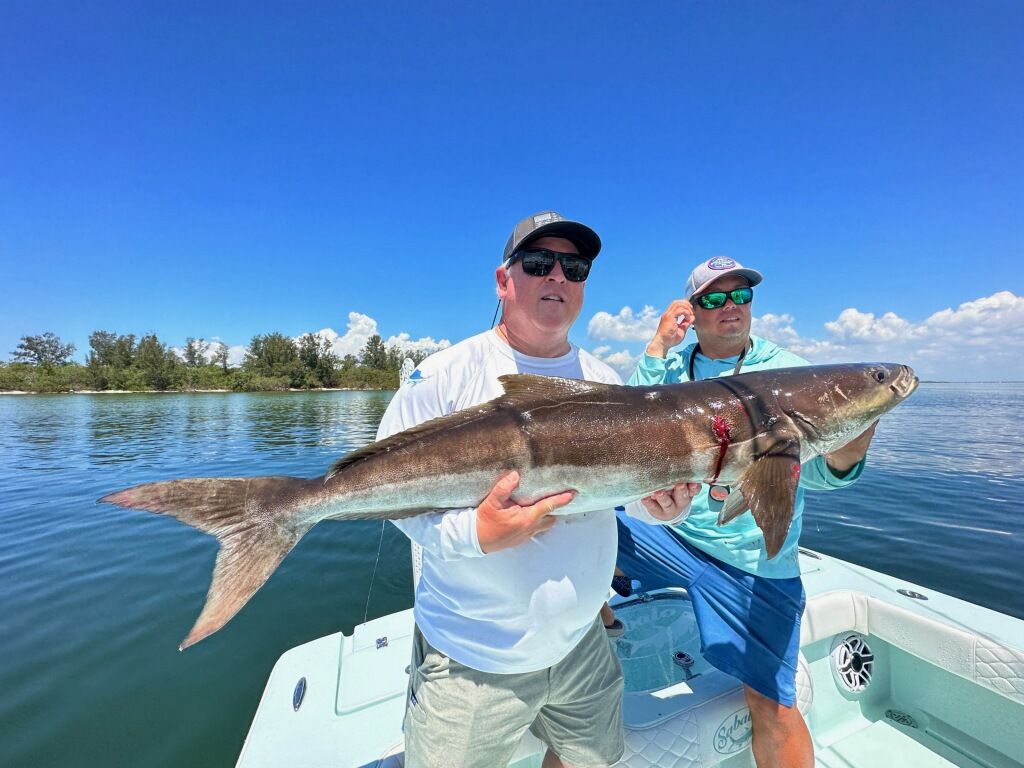Cobia
Cobia (Rachycentron canadum) is a highly sought-after game fish in Florida, known for its strong fighting ability and excellent table fare. These fish are easily identified by their elongated, spindle-shaped bodies, broad flattened heads, and a dark brown color that fades to a white belly. They also feature distinctive, dark lateral bands that run from the gills to the base of the tail.
In Florida, Cobia are found both inshore and offshore, often near structures such as reefs, buoys, and wrecks. They are known for their curious nature, often following larger species like sharks, turtles, and manta rays. The
International Game Fish Association (IGFA) all-tackle world record for cobia is 135 pounds, 9 ounces, caught by Peter Goulding off the coast of Australia in 1985.

How big do Cobia get?
In the Tampa Bay area, Cobia can grow quite large, typically ranging from 20 to 50 pounds. However, it's not uncommon for anglers to catch specimens exceeding 60 pounds. These powerful fish are known for their impressive size and strength, making them a popular target for sport fishing in the region. The largest Cobia caught in the Tampa Bay area have been reported to approach the 80-pound mark, providing an exciting challenge for even the most experienced anglers.
How fast do Cobia grow?
Cobia are known for their rapid growth rate. In the first year of life, Cobia can grow up to 12 inches in length. By the time they are two years old, they can reach 36 inches and weigh between 15 to 20 pounds. This fast growth rate continues as they mature, with some Cobia reaching lengths of 6 feet and weights of over 100 pounds in just a few years. This rapid growth is one reason why Cobia are a popular target for both recreational and commercial fisheries.
What are the best techniques to catch Cobia?
The best fishing techniques for Cobia in Tampa Bay include sight casting to surface-cruising fish and chumming near structures like rock piles, artificial reefs, shipping channels, and large markers. Sight casting involves visually locating Cobia near the surface and casting bait or lures directly to them, often using elevated platforms for a better view. Chumming, which involves dispersing live and dead bait to attract Cobia to your spot, anchoring up current, and creating a chum slick can also be a great technique. Cobia are frequently found around structures like range markers, buoys, pilings, ropes, and chains, where they find shade and baitfish. Using a variety of live baits such as small crabs, live shrimp, pinfish, and whitebait, along with artificial lures like bucktail jigs and Hogy lures, can be very effective. Equip your boat with multiple rods rigged with 15-50 lb. test braid and 25-50 lb. test fluorocarbon leader for long, accurate casts. Combining these techniques ensures a successful and exciting Cobia fishing experience in Tampa Bay.
When is the Peak Season for Cobia?
The peak season for Cobia fishing in Tampa Bay is from April through July, during which migratory Cobia invade the bay to feed and breed, offering excellent fishing opportunities. Additionally, some Cobia are considered resident and stay in Tampa Bay year-round, often found around power plants and warm water areas even in winter. This mix of migratory and resident populations ensures that anglers can target Cobia throughout the year.
Where is the best place to catch Cobia?
To handle Cobia safely, use a landing net or gaff to bring it aboard. Secure the fish quickly by holding it firmly around the head and tail, avoiding sharp dorsal spines. Use a wet towel or gloves for a better grip. If releasing, minimize handling time, keep the fish in water, gently remove the hook with pliers, and revive it by moving it back and forth in the water until it swims away strongly.
Can we catch Cobia on our Badfish Charter?
Yes, it's possible we can catch Cobia on our charters out of
Anna Maria,
Bradenton,
Palmetto,
Ruskin,
Tampa,
Sarasota, and
Siesta Key. Any additional questions? Give us a call we will give you all the details.

